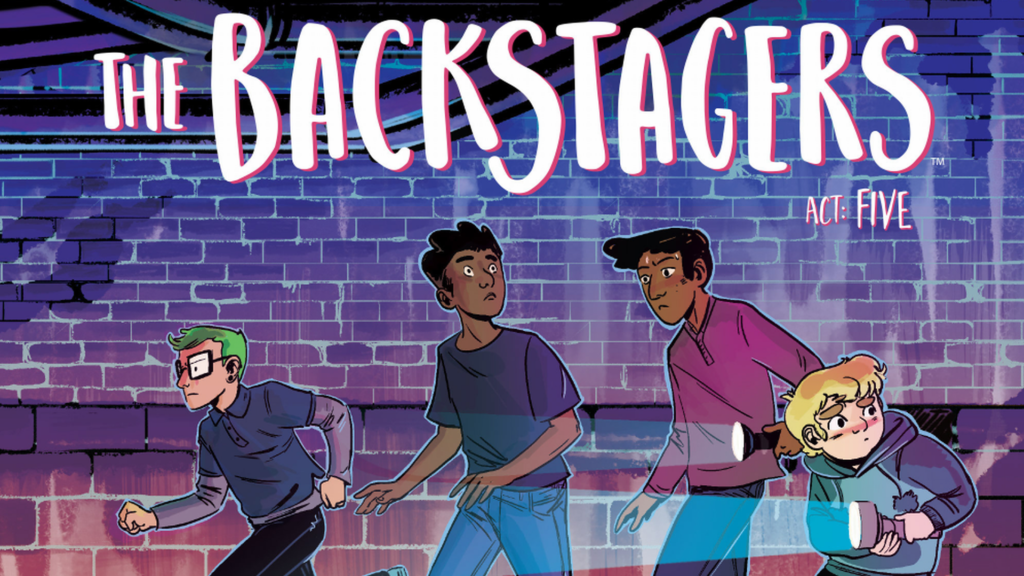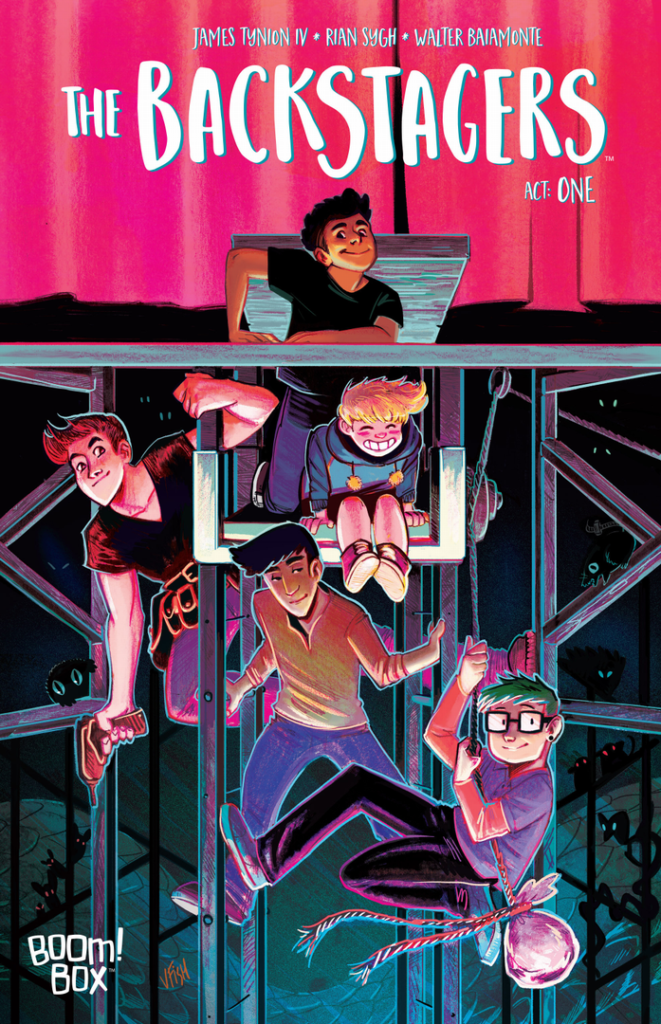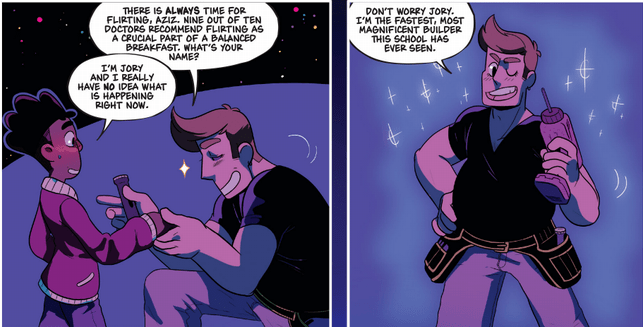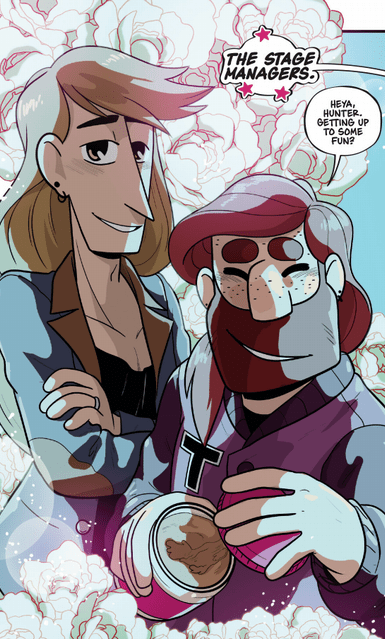
Comics Corner – The Backstagers needs to stage a comeback
If your school was – or is, younglings – fortunate enough to have a theatre club, you’ll know it’s generally a haven for the queer kids. Yes, the literal queer kids – the LGBTQ+ kids still trying to define themselves – but also the creatives, the outsiders, those still not sure of themselves and seeking to explore. It can be a magical world of self-discovery – but what goes on backstage may be even more interesting.
That’s the simple but brilliant hook of The Backstagers, a 2016 all-ages series by writer James Tynion IV and artists Rian Sygh, with covers by Veronica Fish. Set at the all-boys school of St Genesius, the comic follows new kid Jory as he struggles to fit in. Initially drawn to the theatre club in search of finding friends, he instead finds his calling behind the scenes as a stage hand – or Backstager.

At St Genesius though, “behind the scenes” means a hidden world of strange creatures, shifting corridors, and weird rooms full of unthinkable creations, loosely operated – and even more loosely navigated – by the kids everyone else ignores. It’s a world that only the ignored and overlooked Backstagers know of, and use to fantastic effect to put on elaborate productions that the actors themselves barely acknowledge the Backstagers’ contribution to.
Jory’s first, cautious exploration back stage sees him run into the existing Backstagers – Sasha, Aziz, Beckett, and most importantly the handsome Hunter – as they’re attempting to deal with an infestation of tool rats, voracious rodents made of stage tools that threaten to devour the entire set. With keen observation and quick thinking, Jory helps solve the crisis and, bewitched by the mysterious domain he’s discovered, decides to join the crew. Tool rats are far from the biggest danger lurking back stage though, and soon Jory and his new friends are caught up in a decades old mystery – just what happened to a group of Backstagers who went missing 30 years earlier?
In many ways, The Backstagers can be seen as an inverted Lumberjanes. Rather than tough-as-nails girls seeking out adventure in a typically male-dominated setting, here it’s a group of sensitive and artistic boys finding a community and exploring their feelings in the world of the arts, which is often seen as feminised, or certainly less than masculine.

Tynion and Sygh don’t shy away from that perception of the stage being the domain of LGBTQ+ people though, and instead use the setting to brilliantly explore young queer identities. While the cast’s sexualities or genders are never labelled, they’re immediately resonant to contemporary readers coming to grips with their own selves, or older readers who remember exploring their identities growing up. Hunter is immediately flirtatious with Jory, showing a confidence that’s often rare for younger gay or bi men, and although shy and uncertain, Jory isn’t fazed – rather, he comes to develop his own feelings for Hunter.
Terrific representation is found in the rest of the cast, too. Beckett is a trans boy, having transferred to St Genesius from the all-girls Penitent Angels, and fosters a frankly adorable crush on his former classmate Bailey Brentwood – AKA “the coolest girl in the world”. Luckily for him, she’s also the lead female actor in St Genesius’ productions, sharing her extra-curricular time with Penitent. Elsewhere, Tim and Jamie, the stage managers and the Backstagers’ older advisors are in a very clearly committed relationship with each other and very supportive of the younger characters – a case of elder gays wholesomely supporting the next generation.
The Backstagers is beautifully composed, too. Sygh’s art has an almost animated quality to it, conveying a fluid motion in panel transitions and page turns, while packing the backgrounds with delightful detail and charming in-jokes (or meme references, which are just as good). There’s a real sense of wonder to Sygh’s pages, and a warmth and expressiveness to the characters that populate them.

The only problem with The Backstagers is that there’s simply not enough of it. The original series ran for eight issues, and was followed by a Valentine’s Intermission and Halloween Intermission – both anthology special issues, with a variety of creators contributing stories – released in 2018. That’s a disappointingly brief time to spend in such a fantastic setting. While there has been a continuation in book form – a series of prose novels, with spot illustrations by Sygh – the lack of more bold and inventive comics set in this world is simply sad.
There’s plenty more to explore in the world of The Backstagers, too. While the main series told a complete storyarc, it left many elements open and questions unanswered. Tynion and Sygh’s main story delved into not only the Backstage of St Genesius, but revealed that every stage in the world was connected by it, from the school stage of Pentitent Angels to the West End theatres of London. It’s a potent and imaginative concept that leaves plenty of material to be mined, be it the Backstages of other schools to the experiences of past groups of Backstagers – something central to both the main story and some of the tales in the anthology specials.
A return would also mean more time to explore the existing characters. Of the core five, Sasha comes across as a gloriously innocent and pure force of nature – half Steven Universe, half Onion from Steven Universe – but with little backstory, and we don’t learn much about Aziz at all, other than he has two younger brothers and promised Sasha’s mother he would take care of him. Both characters are rife with potential, and deserve building on in further stories.
Most importantly, The Backstagers matters. It’s an all-ages comic that tells its target audience that it’s OK to be creative, to be drawn to the arts, to be LGBTQ+, to still be trying to figure yourself out. That’s something younger readers need to see more of, and why The Backstagers needs to make a comeback.





